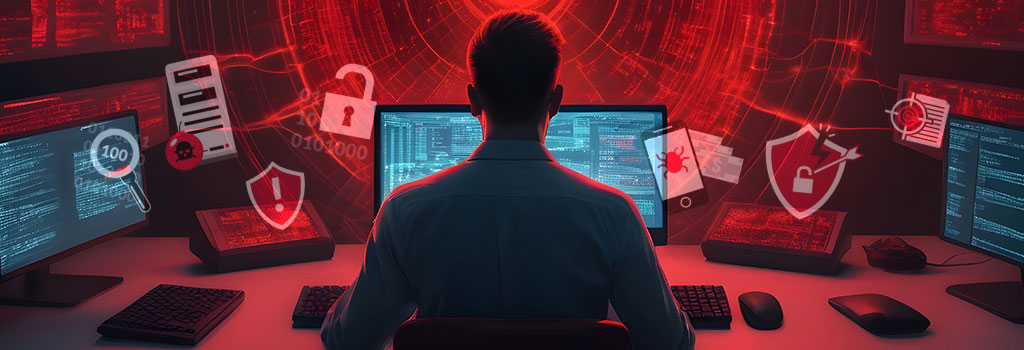Worldwide, digitalisation has changed our way of life; streaming diversion has become a business as usual. The open doors are boundless regardless of marathon watching the most recent series, live games or streaming music. All things above, network safety should not be avoided in the mind.
In this blog, we will talk about various streaming cybersecurity tips, deceives, and best practices, particularly for streaming junkies, that will permit you to encounter your favoured substance without undermining your web-based life.
Understanding cyber threats in the streaming world
In today’s digital landscape, streaming enthusiasts face cybersecurity threats that can compromise their online safety and privacy. Understanding these threats is crucial to protect oneself in the ever-evolving digital world.
Exploring common streaming cybersecurity threats
Cybercriminals often target streaming enthusiasts due to the personal and financial information associated with streaming accounts. Some of the most common threats include:
- Malware: Malware is a type of software that is designed to harm your devices, steal sensitive information or cause damage to your system. Malware can be disguised as legitimate streaming applications or bundled with pirated content.
- Phishing attacks: Phishing attacks are online scams where attackers send fake emails or messages pretending to be from legitimate streaming services. These attacks aim to trick users into revealing their personal information such as login credentials, credit card details, or other sensitive data.
- Data breaches: Data breaches occur when unauthorised individuals gain access to streaming platforms’ databases, resulting in the exposure of users’ personal information, such as usernames, passwords, and payment details. Data breaches can lead to identity theft, financial loss, and other serious consequences.
Highlighting risks associated with unofficial streaming platforms
Streaming from unofficial platforms, which often provide pirated or unauthorized content, poses serious risks for avid streamers and threatens their streaming cybersecurity, such as:
- Legal risks: Streaming pirated content through unofficial platforms violates copyright laws and can lead to legal consequences such as fines or lawsuits.
- Malware and adware: Unofficial streaming sites might contain malware and adware that can pose security threats and compromise users’ devices.
- Lack of security measures: Illegitimate streaming services often need proper security measures, making users more vulnerable to cyber-attacks and data breaches than legitimate ones.
Why should you secure your streaming devices?
Securing your streaming devices is extremely important to protect your digital world. You can take some essential steps to safeguard your devices from potential threats:
1. Keep firmware and software updated
Regularly update the firmware and software of your streaming devices to fix security vulnerabilities and protect against emerging threats.
2. Use strong and unique passwords
Always create strong, unique passwords for your streaming accounts and devices. Additionally, enable Two-Factor Authentication (2FA) whenever possible to add an extra layer of security.
3. Be wary of suspicious links and apps
Beware of clicking on links or installing apps from unknown sources as they may contain malware or lead to phishing scams.
It is also important to stay informed about the latest cybersecurity threats and best practices for securing your streaming devices. Stay proactive in educating yourself and maintaining awareness of potential vulnerabilities.

Secure streaming practices: Tips for safe viewing
In the current digital era, it is crucial to secure your streaming accounts and devices to safeguard your personal information and ensure a secure viewing experience.
By adopting secure streaming practices, you can reduce the possibility of cyber threats and enjoy your preferred content without any concerns.
You may also be interested in Cybersecurity Challenges in Autonomous Driving Technology
Securing your streaming accounts
One of the first steps to enhance your streaming experience’s security is to secure your streaming accounts with robust authentication measures, such as:
Strong passwords
- Create strong, unique passwords for your streaming accounts.
- Use uppercase and lowercase letters, numbers, and special characters to make them difficult to guess.
- Avoid easily guessable passwords such as “123456” or “password.”
Two-Factor Authentication(2FA)
You should enable two-factor authentication as an additional layer of security wherever it is available. Two-factor authentication requires you to provide a second verification method, such as a unique code sent to your mobile device and your password. This makes it significantly more difficult for unauthorised/ users to access your account.
Regular password updates
It’s a good idea to update your streaming account passwords to prevent unauthorized access regularly. A password manager can help you securely store and manage your passwords.
Importance of regular software updates
It’s important to regularly update the firmware and software of your streaming devices and applications to patch security vulnerabilities and protect against potential threats. Let’s get deep in it:
- Firmware update: It’s important to regularly check for and install firmware updates for your streaming devices, such as smart TVs, streaming sticks, and gaming consoles. Manufacturers frequently release updates to address security vulnerabilities and enhance device performance.
- Software updates: it’s essential to keep your streaming applications, like Netflix, Hulu, or Spotify, up to date by installing the latest versions available. These updates often come with security patches to address vulnerabilities that cybercriminals could exploit.
- Automatic updates: Consider enabling automatic updates for firmware and software to ensure your devices and applications are always up to date with the latest security patches and enhancements. This can save time and effort, as you won’t have to manually check for updates yourself.
Use of Virtual Private Networks (VPNs)
Virtual Private Networks (VPNs) are a great way to enhance your privacy and security while streaming content online, especially when using public Wi-Fi networks. Here are some benefits of using a VPN:
- Privacy Protection: A VPN encrypts your internet traffic, which makes it difficult for others to intercept or monitor your online activities. This ensures your privacy and sensitive information is protected from eavesdropping or surveillance.
- Security Enhancement: By routing your internet traffic through a secure VPN server, you can lower the risk of cyber threats, such as man-in-the-middle attacks or malicious actors trying to intercept your data.
- Access Geo-Restricted Content: VPNs allow you to bypass geo-restrictions and access region-locked content on streaming platforms. This is done by masking your IP address and providing a virtual location in another country.
Selecting a reputable VPN provider that offers robust encryption protocols and a strict no-logs policy is important. This ensures maximum privacy and security while using a VPN. Be sure to research and choose wisely.

Protecting personal data while streaming: Risks of sharing personal information
When you use streaming platforms and social media, you put yourself at risk of exposing personal information. There are some inherent risks associated with sharing your details online:
- Privacy concerns: Sharing your full name, date of birth, address, or phone number on streaming platforms and social media can compromise your privacy, putting you at risk of identity theft, stalking, or targeted advertising.
- Data collection: Streaming platforms and social media networks collect user data for targeted advertising and analytics. However, this data collection may extend beyond what you are comfortable with, potentially leading to the misuse or unauthorized sharing of your personal information.
- Security breaches: In a security breach or data breach on a streaming platform or social media network, your personal information could be exposed to cybercriminals, leading to identity theft or other malicious activities.
- Safeguarding sensitive data: When making purchases or subscriptions to streaming services, protecting sensitive data, such as credit card information, is essential.
- Use trusted platforms: Only make purchases or subscriptions to streaming services through trusted and reputable platforms with secure payment systems. Look for specific payment methods like credit cards with fraud protection or trusted third-party payment processors like PayPal.
- Secure connection: Ensure you use a fast internet connection when entering sensitive information, such as credit card details. Avoid making purchases or subscriptions on public Wi-Fi networks, as they may be susceptible to interception by cybercriminals.
- Review security measures: Review the security measures implemented by streaming services, such as encryption protocols and data protection policies, to ensure the safety of your sensitive data.
Protecting personal data while streaming: Adjusting privacy settings
It is important to adjust the privacy settings on streaming platforms and social media networks to control who can view your streaming activities. To do this, you should review the privacy policies of these platforms to understand how your personal information is collected, used, and shared.
You should also adjust your privacy settings to limit the visibility of your profile or content to trusted contacts or friends only. Additionally, you can opt out of data collection and targeted advertising whenever possible to minimise the amount of personal information shared with third parties.
It is recommended that you regularly review and update your privacy settings to ensure they reflect your preferences and comfort level when sharing personal information online.
By being aware of the risks associated with sharing personal information on streaming platforms and social media, safeguarding sensitive data when making purchases or subscriptions, and adjusting your privacy settings to control visibility, you can protect your personal information and enjoy a safer streaming experience.
Conclusion
As the entertainment industry continues to shift towards streaming, it is becoming increasingly important to prioritise cybersecurity to protect your digital experience.
By following the tips and best practices outlined in this series, you can enjoy your favourite content with peace of mind, knowing that your online activities are safeguarded against potential threats.

Lets Talk!
If you have additional comments or questions about this article, you can share them in this section.